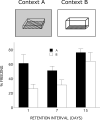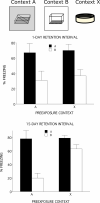Context preexposure prevents forgetting of a contextual fear memory: implication for regional changes in brain activation patterns associated with recent and remote memory tests - PubMed (original) (raw)
Context preexposure prevents forgetting of a contextual fear memory: implication for regional changes in brain activation patterns associated with recent and remote memory tests
Joseph C Biedenkapp et al. Learn Mem. 2007.
Abstract
Contextual fear conditioning was maintained over a 15-day retention interval suggesting no forgetting of the conditioning experience. However, a more subtle generalization test revealed that, as the retention interval increased, rats showed enhanced generalized fear to an altered context. Preexposure to the training context prior to conditioning, however, prevented this enhanced generalized fear from developing. These results support the hypothesis that the memory representation of the context degrades as the memory ages and is responsible for enhanced generalization. The implications of these results for systems consolidation versus forgetting interpretations of regional changes in neural activation patterns that occur as memories age are discussed.
Figures
Figure 1
A. Illustration of the two contexts used in the first experiment. Context A was the training context and Context B was the generalization test context. B. Mean percentage freezing as a function of retention interval. Rats displayed significantly more freezing to Context A than to Context B, but only when the retention interval was 1 day. Error bars represent SEM.
Figure 2
A. Illustration of the three contexts used in the second experiment. Context A was the training context and Context B was the generalization test context. Rats were either preexposed to Context A or Context X. B. The mean percentage freezing when the retention interval was 1 day. Regardless of preexposure condition, rats displayed significantly more freezing to Context A than to Context B. C. The mean percentage freezing when the retention interval was 15 days. Rats preexposed to Context A displayed significantly more freezing to Context A than to Context B, but rats preexposed to the control Context, X, displayed the same level of freezing in both context. Error bars represent SEM.
Comment in
- Forgetting of stimulus attributes: some implications for hippocampal models of memory.
Riccio DC, Joynes RL. Riccio DC, et al. Learn Mem. 2007 Jun 6;14(6):430-2. doi: 10.1101/lm.617107. Print 2007 Jun. Learn Mem. 2007. PMID: 17554088 Review. No abstract available.
Similar articles
- Conditioning- and time-dependent increases in context fear and generalization.
Poulos AM, Mehta N, Lu B, Amir D, Livingston B, Santarelli A, Zhuravka I, Fanselow MS. Poulos AM, et al. Learn Mem. 2016 Jun 17;23(7):379-85. doi: 10.1101/lm.041400.115. Print 2016 Jul. Learn Mem. 2016. PMID: 27317198 Free PMC article. - Stimulus and procedural determinants of the forgetting of conditioned fear.
Wolz JP, Hurst DL, Sherr AP, Spear NE. Wolz JP, et al. Am J Psychol. 1979 Jun;92(2):307-21. Am J Psychol. 1979. PMID: 474835 - Activity of the anterior cingulate cortex and ventral hippocampus underlie increases in contextual fear generalization.
Cullen PK, Gilman TL, Winiecki P, Riccio DC, Jasnow AM. Cullen PK, et al. Neurobiol Learn Mem. 2015 Oct;124:19-27. doi: 10.1016/j.nlm.2015.07.001. Epub 2015 Jul 9. Neurobiol Learn Mem. 2015. PMID: 26165137 - Perspectives on fear generalization and its implications for emotional disorders.
Jasnow AM, Lynch JF 3rd, Gilman TL, Riccio DC. Jasnow AM, et al. J Neurosci Res. 2017 Mar;95(3):821-835. doi: 10.1002/jnr.23837. Epub 2016 Jul 22. J Neurosci Res. 2017. PMID: 27448175 Review. - Systems consolidation and the content of memory.
Wiltgen BJ, Tanaka KZ. Wiltgen BJ, et al. Neurobiol Learn Mem. 2013 Nov;106:365-71. doi: 10.1016/j.nlm.2013.06.001. Epub 2013 Jun 14. Neurobiol Learn Mem. 2013. PMID: 23770492 Review.
Cited by
- Sex and the facilitation of cued fear by prior contextual fear conditioning in rats.
Vazquez K, Cole KE, Parsons RG. Vazquez K, et al. Learn Mem. 2024 Sep 26;31(9):a054010. doi: 10.1101/lm.054010.124. Print 2024 Sep. Learn Mem. 2024. PMID: 39327023 - Remote memory in a Bayesian model of context fear conditioning (BaconREM).
Krasne FB, Fanselow MS. Krasne FB, et al. Front Behav Neurosci. 2024 Mar 7;17:1295969. doi: 10.3389/fnbeh.2023.1295969. eCollection 2023. Front Behav Neurosci. 2024. PMID: 38515786 Free PMC article. - Retrieval and savings of contextual fear memories across an extended retention interval in juvenile and adult male and female rats.
Odynocki N, Isaacs Z, Poulos AM. Odynocki N, et al. Behav Neurosci. 2023 Dec;137(6):339-346. doi: 10.1037/bne0000569. Epub 2023 Oct 30. Behav Neurosci. 2023. PMID: 37902699 - Anterior cingulate cortex projections to the dorsal hippocampus positively control the expression of contextual fear generalization.
Nagayoshi T, Ishikawa R, Kida S. Nagayoshi T, et al. Learn Mem. 2022 Feb 15;29(3):77-82. doi: 10.1101/lm.053440.121. Print 2022 Mar. Learn Mem. 2022. PMID: 35169046 Free PMC article. - The environmental sculpting hypothesis of juvenile and adult hippocampal neurogenesis.
Cushman JD, Drew MR, Krasne FB. Cushman JD, et al. Prog Neurobiol. 2021 Apr;199:101961. doi: 10.1016/j.pneurobio.2020.101961. Epub 2020 Nov 23. Prog Neurobiol. 2021. PMID: 33242572 Free PMC article.
References
- Antoniadis EA, McDonald RJ. Amygdala, hippocampus, and discrimination fear conditioning to context. Behav. Brain Res. 2000;108:1–19. - PubMed
- Bontempi B, Laurent-Demir C, Destrade C, Jaffard R. Time dependent reorganization of brain circuitry underlying long-term memory storage. Nature. 1999;400:671–674. - PubMed
- Eysenck HJ. A theory of the incubation of anxiety/fear responses. Behav. Res. Ther. 1968;6:309–321. - PubMed
- Fanselow MS, Rudy JW. Convergence of Experimental and Developmental Approaches to Animal Learning and Memory Processes. In: Carew T, Menzel R, Shatz C, editors. Mechanistic Relationships between Development and Learning: Beyond Metaphor. Dahlem Workshop Report. John Wiley & Sons Ltd; Chichester: 1998. pp. 15–29.
- Fletcher PC, Henson RNA. Frontal lobes and human memory. Insights from functional neuroimaging. Brain. 2001;124:849–881. - PubMed
Publication types
MeSH terms
LinkOut - more resources
Full Text Sources
Other Literature Sources
Medical

